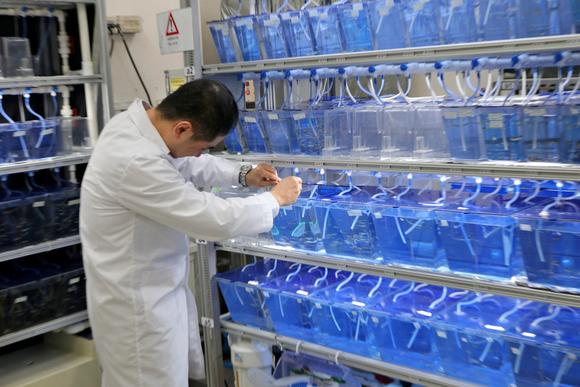

Taiwanese university to become aquarium fish powerhouse
A Taiwanese university is boosting its position as an aquarium fish powerhouse
TAIPEI
For people in the know, Taiwan is the go-to place for aquarium fish. That status is being enhanced by a new slate of specialty courses offered by the graduate school at National Pingtung University of Science and Technology in southern Taiwan. According to the university, the new curriculum is the first graduate course of its kind to specialize in aquarium fish. Its aim is to build a world-class research base, drawing on human resources and know-how backed by a partnership between industry and academia.
"Developing new species of aquarium fish in some cases requires gene recombination, so it is important to make it so they cannot reproduce so as to not destroy the natural ecosystem if they are released into the ocean," said assistant professor Hu Shao-yang. Standing in a cramped research lab lined with fish tanks, he emphasized that particular knowledge is necessary in breeding aquarium fish.

Pingtung County, where the university is located, is a region in Taiwan where the agriculture, forestry and fisheries industries flourish, and the school has produced top-class results in Taiwan in the fields of veterinary medicine and breeding. Because the curriculum has only just been established, enrollment is just five students despite room for 12, but enrollment is expected to increase starting from next year. The research fields will be quite broad, including development and breeding technology for new species; research and development of related equipment and materials; research on the aquarium fish industry and sales; and diagnosis, prevention and treatment of diseases.
The person in charge, professor Chen Shih-chu, explains that in breeding aquarium fish, "maintaining health is particularly important." After all, expensive aquarium fish that promptly die do not tend to sell well. Not only are multicolored new species being developed, but the scope of the research is unexpectedly broad, including prevention and treatment of infectious diseases and equipment that regulates water quality so that the fish live longer.
INTERNATIONAL COOPERATION
International-mindedness being at the forefront, all of the lectures will be conducted in English. The University of Stirling in the U.K., Cornell University in the U.S., and Japan's University of Miyazaki and Tokyo University of Marine Science and Technology are also participating. Of the 20 teachers, including visitors, seven are affiliated with foreign universities. There are plans to enhance the courses through research cooperation and school visits.
"Training overseas will also be emphasized. The plan is to conduct training even in Hiroshima, which is famous for breeding golden carp," Chen said.
"There is an opportunity to learn from leading foreign instructors, so I am satisfied," said 31-year-old Phan, who hails from Vietnam. In his homeland, he is affiliated with an agriculture-related research institution, and in the special course, he is learning primarily disease prevention and vaccine development. Miguel, a 27-year-old from Latin America, is also studying disease-related courses. "After graduation, I want to return to my homeland with this know-how and contribute to agriculture," he said.
Preferences for aquarium fish vary from country to country and region to region, and in China at present, golden carp are reportedly all the rage. There is also significant variability in breeding environments due to differences in climate and such, so local development and breeding is key. The aim is to foster research and exchange among students on a global level, accumulate expertise and become the core of the world's aquarium fish research.
Marine breeding has long flourished in Taiwan, but it has only been since 2003 that aquarium fish have entered the limelight. For example, the zebrafish, with its distinctive fluorescent colored stripes, has been the subject of development by researchers at National Taiwan University. Lately the new strains have been drawing attention from around the world. Seizing the opportunity, various Taiwanese research institutions began developing unique aquarium fish, increasing the country's presence globally.
Source : Nikkei.com




















































